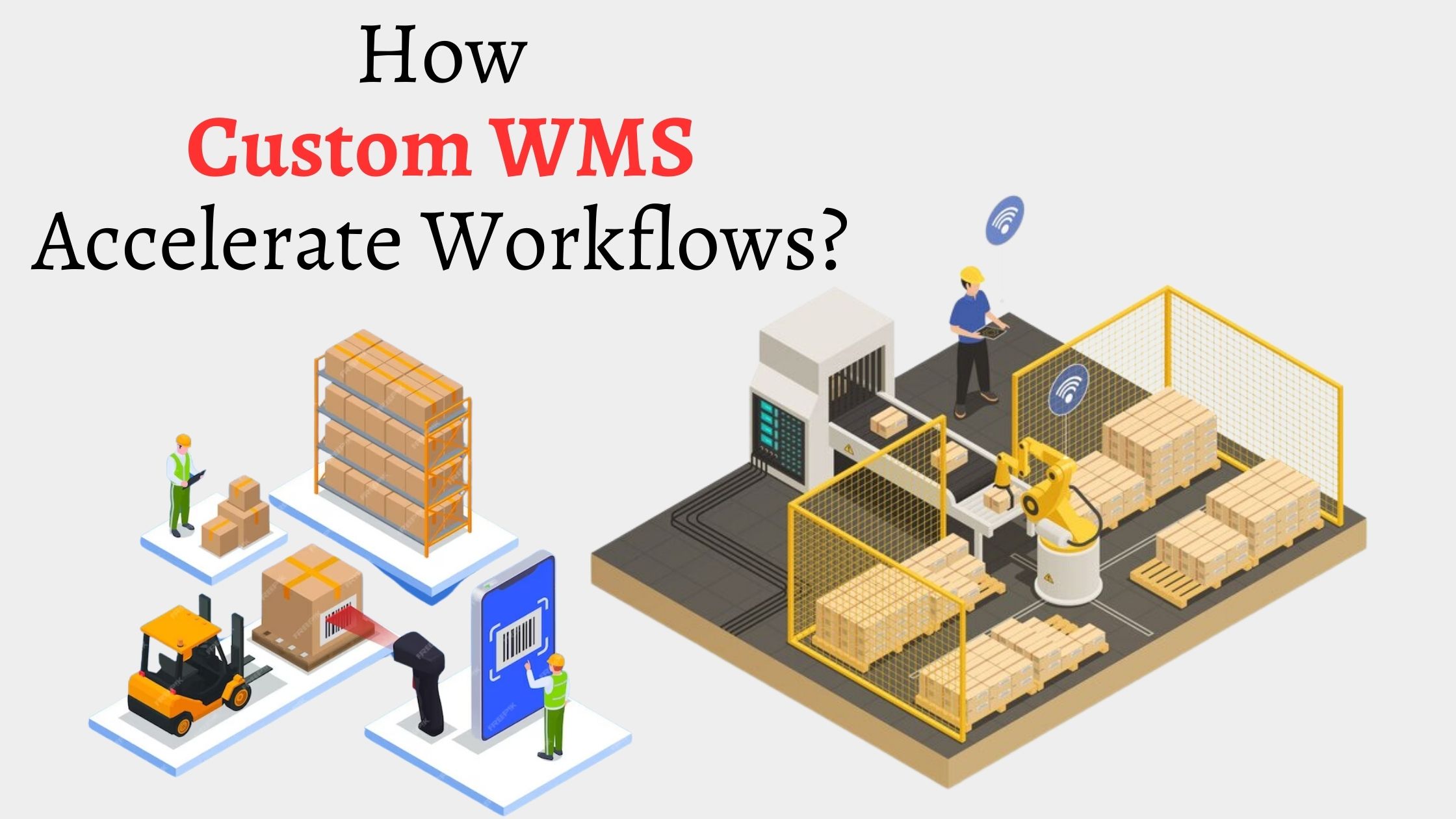- Overview of Warehouse Management Software
- Challenges in Traditional Workflows
- How Warehouse Management Software Solved Them?
- Key Features of Warehouse Management Software
- Benefits of Warehouse Management System
- Merits of Investing in Custom Warehouse Management Solutions
- How can Warehouse Management Software be Helpful for eCommerce Businesses?
- Who Utilizes Custom Warehouse Management Software?
- Custom Warehouse Management System vs Off-the-Shelf Solutions
- How Much Does it Cost to Develop WMS?
- Why is CSSChopper the Right Custom Software Development Company?
We live in a world where efficiency and agility are paramount for a business to stay competitive in this dynamic landscape. The constant rise in market demands and the evolution of newer and significant technologies are why businesses face an ongoing challenge in optimizing their storage and shipping processes. Warehouses serve as the backbone of the supply chain at the front of this endeavor and are tasked with prompt and cost-effective delivery of goods.
But, the traditional way of dealing, storing, and managing was paper-heavy, time-consuming, and inefficient in this modern era. Because of the growing competition, that makes it difficult for a business to keep up with the pace. This is where the need for a warehouse management system can not be overlooked. The global market size of a WMS was valued at around $3,413.9 million in 2022 and will grow at a CAGR of 19.0% from 2023 to 20230. This showcases the increasing demand for warehouse management systems in the major sectors.
It acts like the brain behind the operation, which helps keep track of inventory, processing orders, and shipping products smoothly. While they are ready-made solutions, the power of tailored software solutions can not be overstated. However, developing an efficient warehouse management system requires skills and expertise. A small mistake in the code can cost you plenty. Hence, working with a custom software development company for your project is advisable. The experts will help you develop software that relates to the requirements of your business.
Overview of Warehouse Management Software
It is a software solution that allows a business to manage inventory effectively, streamline order fulfillment, and optimize warehouse operations. Simply put, it is a software solution that effectively empowers a business to manage and control all day-to-day warehouse operations. This includes inventory management, order processing, picking and packing, order and tracking, and so on.
Its fundamental role is to record the arrival and departure of inventories. To improve the efficiency of your project, one can add additional features in the WMS, like precise stock location, tracking within the warehouse, space utilization, and so on.
An organization can save time, money, and resources by utilizing warehouse management systems. Not only that, but it helps in improving the overall quality of warehouse operations. You can keep track of every little aspect of your assets, whether location, space, or anything. This helps a business to streamline tasks and know how workers pick, pack, and deliver products.
Challenges in Traditional Workflows
Warehouses are full of complexities where products, papers, and everything else lie scattered. Traditionally, managing it was the biggest challenge for businesses. Some of the main challenges that businesses faced earlier are illustrated below.
1. Manual Process
Every record was to be kept by the warehouses in a manual form. This was the time when primary focus was given to paper-based work and manual entry of data. The manual way of working was time-consuming and prone to errors.
2. Lack of Real-time Visibility
In eCommerce development, you get analytics and all other features that make it feasible for your business to get real-time data. But in the background (i.e., in warehouses), getting such insights was a formidable challenge in the past. This lacks in getting up-to-date information on inventory levels, status, and all sorts of activities. This makes it difficult for a business to make informed decisions and respond quickly to changing needs.
3. Inefficient Communication
When there was no technology to manage all the activities of a warehouse, hindrances in communication were evident. This was often the reason behind communication gaps between diverse departments, leading to delays in the fulfillment process.
How Warehouse Management Software Solved Them?
Earlier, warehouse challenges were the bottlenecks hindering the productivity and efficiency of a business. The advent of the WMS software systems to address all these challenges has helped a business in improving the inefficiencies and its productivity level. Here is how this software has solved them.
1. Automation
This software empowers a business to automate various warehouse processes, like inventory, picking and packing, order management, and so on. This helps a business to save time and improve efficiency by automating all the repetitive processes.
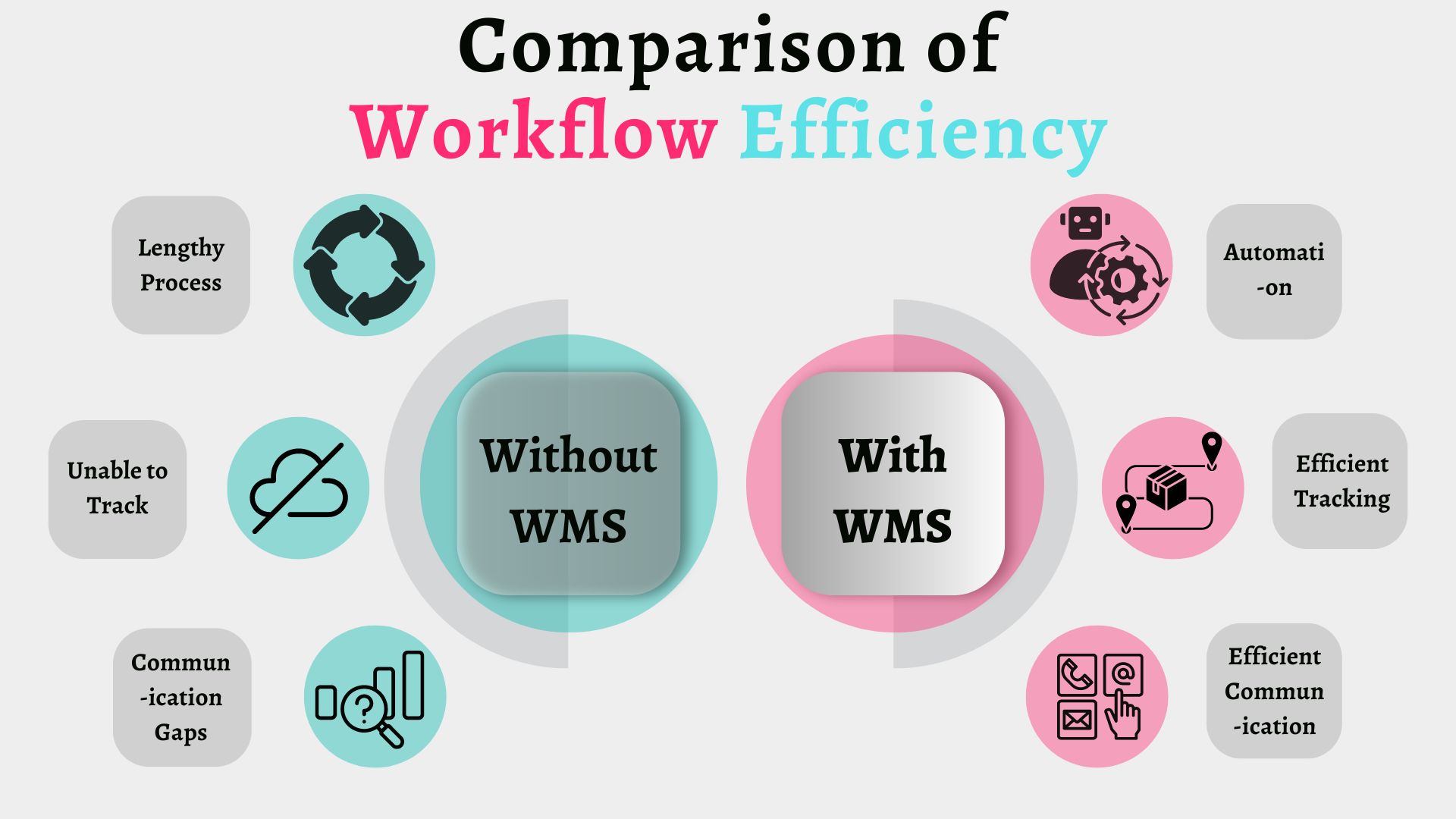
2. Real-Time Tracking
Previously, it was not possible to get real-time insights into the warehouse operations. Warehouse management software has tackled this problem and provided a business with a facility to get real-time tracking of the operations. It provides features like barcode scanning to keep track of inventory movement and monitor order status.
3. Enhanced Communication
WMS facilitates seamless communication and collaboration between diverse departments and stakeholders. A business can improve coordination and streamline workflows because it offers a centralized platform with integrated communication tools.
Key Features of Warehouse Management Software
Warehouse management software (WMS) helps a business manage and keep track of its inventory more precisely and efficiently. You can manage orders, optimize warehouse operations, and also track inventory with a centralized system. Some key features of warehouse systems include:
1. Inventory Management
One of the most critical features of a WMS is that you can keep track of your inventories in real-time. This includes the inventory level, status, and location within the warehouse. It will not only help you keep accurate but also up-to-date records. Some of the significant features of inventory management in warehouse systems include:
- Real-time tracking
- Stock keeping units (SKU) Support
- Barcode scanning
- Inventory Movement Reporting
This way, you can access the most up-to-date information about your inventories.
2. Order Management
Warehouse management software solutions are the modern way of managing orders from varied sources. It empowers you to have an eye on every order from start to finish. This helps you track the status of orders, generate packing slips and shipping labels, and also helps you in providing real-time updates. This feature in a WMS is beneficial as you can get reports on key order data. It allows you to make crucial decisions through data analytics, helpful in becoming more efficient.
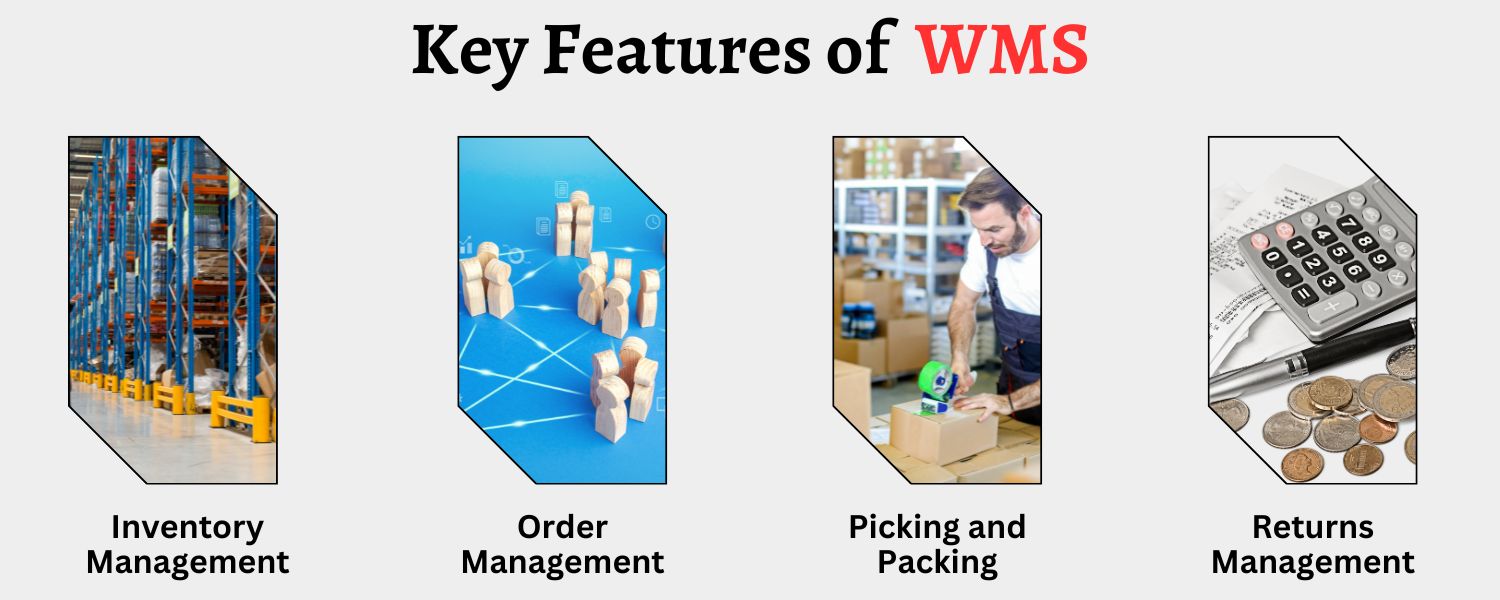
3. Order Picking and Packing
Picking orders and creating a list was a headache previously. With the advent of WMS in the warehousing industry, picking up orders becomes more convenient as the software based on the information sort and prints the lists. Big players in the eCommerce industry, such as Amazon or Alibaba, utilize robots or AI tech in their warehouses.
Picking is one thing, but it can help you in packing. The software will automatically calculate the type and amount of packaging, and based on the information, the optimal packing procedure is followed. Also, the shipping labels can be printed directly from the system. It cuts down on manual work, saving time and energy.
4. Returns Management
Returns are one of the most inevitable parts of an eCommerce business that needs to be adequately managed. All the manual processes and inefficient maintenance of data were the challenges previously. But with a tailored software solution, you can manage the returns more conveniently. It provides a transparent return process on an order and returns received.
Benefits of Warehouse Management System
The technical revolution is an ever-growing phenomenon. One of the improvements has been seen in the warehousing. Software that not only helps a business keep track of its assets but also streamlines how the work is being operated. This is just one of the advantages of warehouse management systems. Some of the main benefits are highlighted below:
1. Real-time Inventory data
A warehouse management system allows a business to get real-time data on its inventory. Your employees can make use of this data by accessing the information whenever they need it. This will help them stay informed, speeding up the outbound delivery process.
2. Reduces Operating Expenses
It helps a business in reducing operating expenses. Streamlining and optimizing warehousing costs helps you save significant costs such as labor, inventory carrying, warehouse space utilization, and other related costs. This can directly impact the bottom line of a business. A business can improve its profitability and competitiveness in the market by effectively utilizing this software.
3. Improve Demand Forecasts
You can get valuable insights into future demand forecasts. Now, the question must be, how can you get future predictions? This is because you get better visibility on which stock type is more demanding. Sometimes, these can be more accurate.
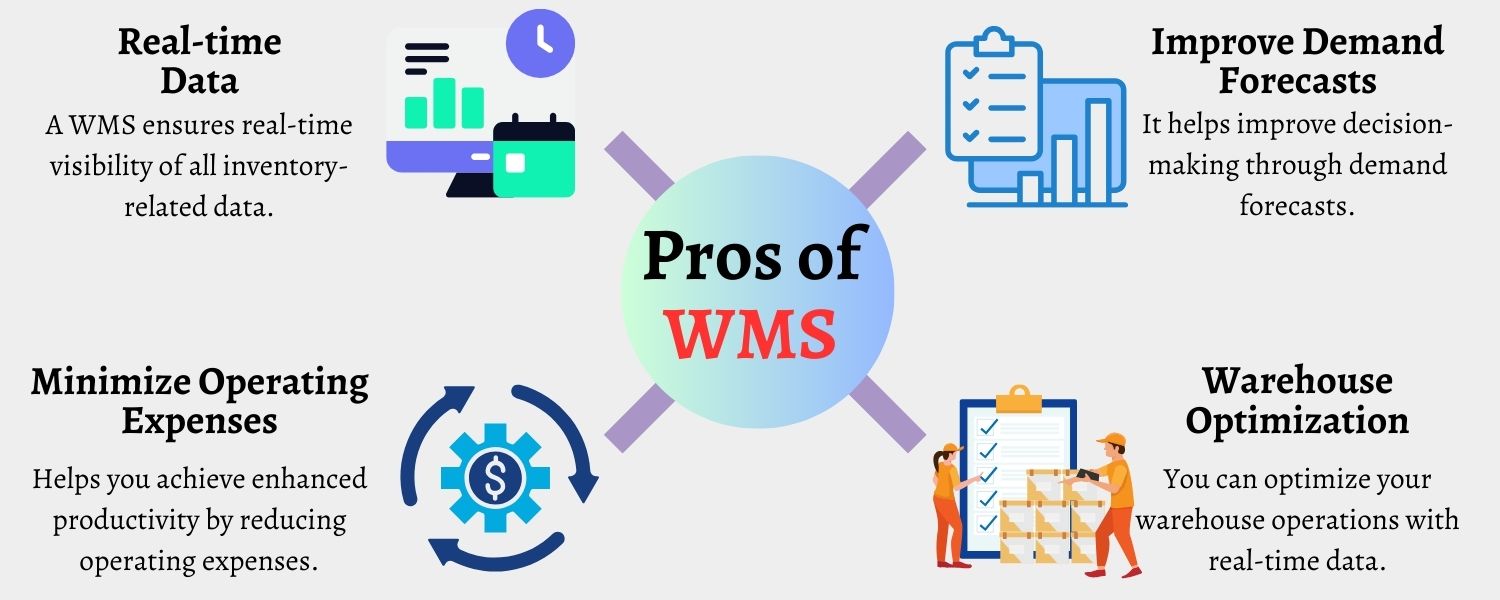
This WMS system can be utilized to collect data on the current outbound and inbound movements of materials, as well as historical trends for forecasting. When you have accurate information, it will help you allow your staff to maintain optimal inventory levels. This, in turn, means that the inventory is adequately stocked to meet the needs of consumers.
4. Warehouse Optimization
All the features of warehousing software provide valuable insights to a business like space utilization, order fulfillment, returns management, and other vital metrics. These insights will help a business make the required changes and improvements to the warehouse layout, process, as well as procedures. This is beneficial in making the processes more seamless and practical.
Merits of Investing in Custom Warehouse Management Solutions
Every business is different based on how it operates, its needs, and other things. Utilizing ready-made software or a website can sometimes become unable to fit as per the requirements. This is where developing custom software with the help of a custom software development company can help you gain a competitive edge in the market.
1. On-demand Functionality
Warehouse management allows a business to improve productivity and efficiency. Developing software to manage all your warehousing operations will be a plus point for your business. Custom software development allows you to develop the required functionality and architecture to fit all your warehouse needs. You can add the required features at any time during the development process. Thus, your WMS will be equipped to sustain longer with the ever-changing business needs.
2. Improved Scalability
One of the benefits of developing custom warehouse software is that you get enhanced scalability. This means that you have the freedom to implement the required level of scalability that is based on the number of users and warehouses, frequency, and other crucial aspects during the development process.
Moreover, you invest once in custom software development, which allows you to scale your organization on the go. A scalable custom WMS is helpful for a business to add as many users as it wants free of cost.
3. Custom Module
A custom warehouse management system allows a business to integrate distinctive modules that are tailored to meet your inventory, shipping, logistics, and all other supply chain fulfillment needs. Your hired bespoke software development service provider can also implement the software on any platform that helps you keep track of the inventory from any device.
How can Warehouse Management Software be Helpful for eCommerce Businesses?
ECommerce is ever-competitive in this fast-paced world where customer satisfaction and efficient order fulfillment are essential. The role of a streamlined warehouse system is crucial here. This software is a game-changer for online commerce businesses looking to optimize and gain a competitive edge in the market.
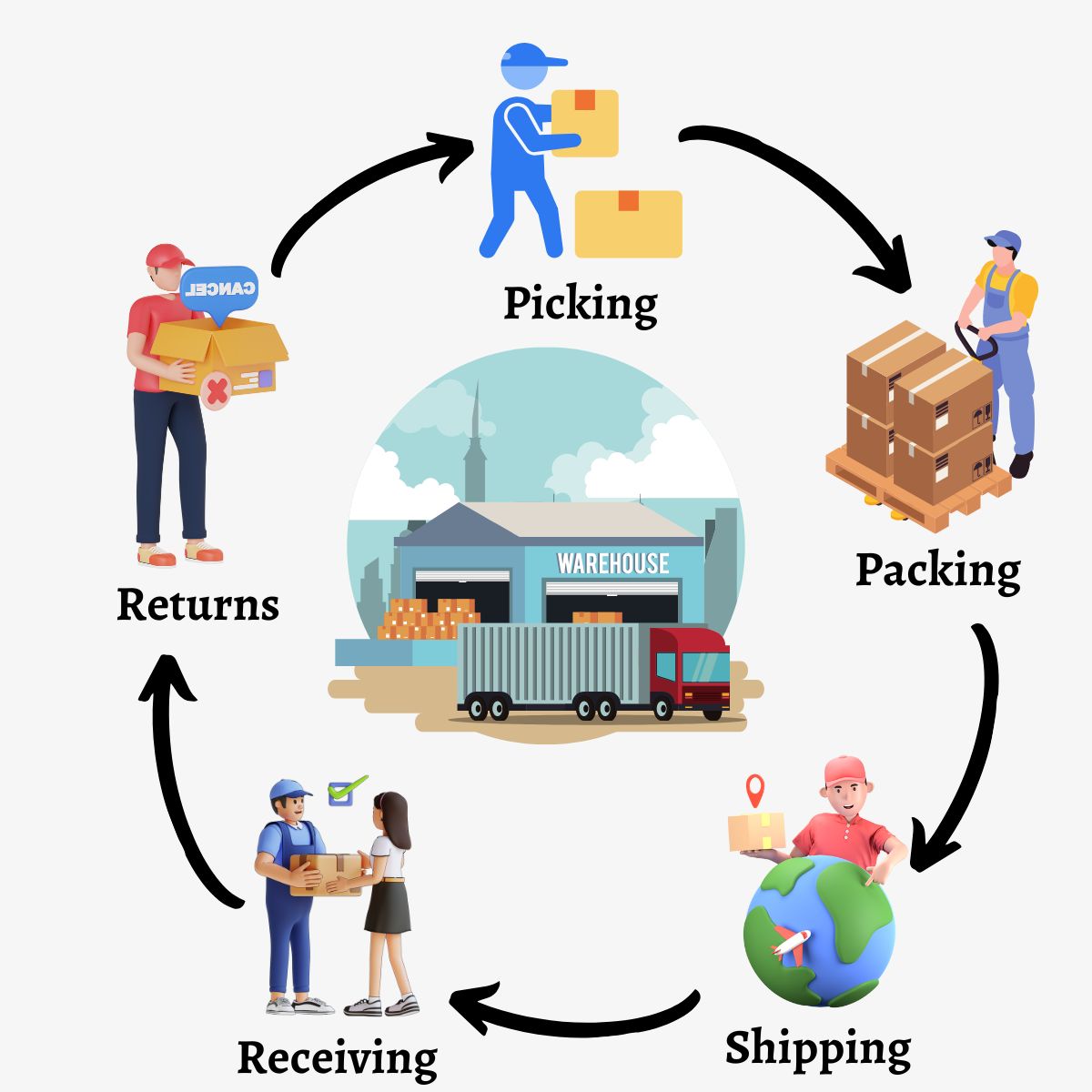
It can be helpful for a business in various ways:
- You can identify trends and patterns in your inventory and order data. This valuable information can be utilized to make informed decisions about stocking levels, purchasing, as well as in shipping.
- Like in eCommerce development platforms, you can get valuable insights and improve the shortcomings. With software to manage warehouse operations, you can get data-driven insights and improve your business’s decision-making capability.
- Not only that, you can scale your business without sacrificing efficiency. This software empowers you to handle large volumes of inventory and orders accurately.
Who Utilizes Custom Warehouse Management Software?
One size fits all is not a valid concept also in the warehousing industry. This is because the requirements can vary from business to business. There are different types of warehouse management systems that a business can choose based on the way it operates. However, a custom system improves the internal operations and services of your eCommerce, logistics, and retail business operations. These features are not available in off-the-shelf solutions.
1. Manufacturers
A manufacturing company can utilize this software type to manage raw materials, track the progress of work, and optimize the distribution process.
2. Third-Party Logistics (3PL) Providers
3PL providers use this software to manage their warehouse operations. This is because it can help them optimize storage space, and improve logistics operations.
3. E-commerce Companies
Online retailers rely heavily on warehouse management software. This is because they can manage inventory across multiple warehouses or fulfillment centers, automate order processing, and improve shipping efficiency.
4. Wholesalers and Distributors
Wholesalers and distributors also use warehouse management software. This helps them manage large volumes of inventory, track shipments, and streamline order processing.
5. Food and Beverage Companies
Companies in the food and beverage industry use warehouse management software to ensure compliance with food safety regulations. Not only that, they can manage their inventory, and optimize storage and distribution processes.
Custom Warehouse Management System vs Off-the-Shelf Solutions
You must be wondering how to select a warehouse management system. Doubt between custom and off-the-shelf solutions is an arguable topic. However, this can be sought out if you are aware of factors like your budget, timeline, level of customization, etc., and you can make the right choice.
| Custom Warehouse Management System | Off-the-shelf Solutions | |
| Tailored functionality | These are tailored software solutions that are designed to meet specific requirements. | These are commonly designed for different user types. |
| Adaptability | These are highly adaptable. | Not that much adaptable |
| Features | Required features that relate to your business needs. | These are jam-packed with a range of unwanted features. |
| Scalability | These are highly scalable solutions | Scalability is a concern with off-the-shelf solutions |
| Cost | Requires significant upfront investment but provides long-term cost-effectiveness. | Less upfront cost, but annual maintenance and subscriptions in the long run are costly. |
How Much Does it Cost to Develop WMS?
The cost of development can differ from industry to industry. When you are looking to develop one for your business, it is crucial to know the underlying factors that impact the cost. These are the location of the custom software development company, the required number of features, and the level of complexity.
For instance, developing a highly complex WMS software system with advanced features can cost you more than one with basic features and functionality. This is because software with complex features requires more experience and expertise than simple ones. Here is an approximate cost tabular presentation of warehouse management software based on the complexity.
| Software Type | Approximate Cost | Approximate Timeframe |
| Basic | $20,000 -$50,000 | 3 to 6 months |
| Moderate | $65,000 – $1.10, 0000 | 8 to 9 months |
| Highly Complex | $1,25,000 – $2,50,000 | 10+ months |
Why is CSSChopper the Right Custom Software Development Company?
You can take your operations to higher efficiency, speed, and accuracy with the adequate WMS software system for your business. Here, working with the right software development company is essential. This is where CSSChopper can help you. We start by understanding the requirements of your project and, based on that, take further steps.
Our core experience in utilizing advanced technologies in warehouse management software ensures optimal workability. We work with precision and perfection with our client-centric developers.
We have been in the market for over a decade and have served various industries, including healthcare, logistics, eCommerce, and others. Our team will help you develop a WMS with on-demand functionality that will help you attain better productivity and visibility.
Categories
Recent Posts
Popular Posts
- How to Choose a Reliable Offshore Development Partner?
- Transforming Web Development with HTMX’s Declarative Approach for Dynamic UIs
- Why Your Conversion Funnel Needs a Composable Commerce Solution?
- How to Outsource Web Development in 2025: Complete Guide
- What are the Top Web Development Trends for 2025?

